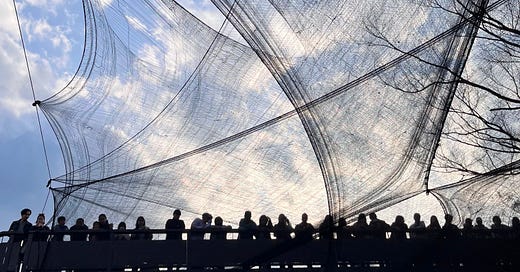“‘You are perhaps a ‘yang’ person; your mind is ‘boiling,’ even at night.” — Marie Darrieussecq quoting her Norwegian translator, Elin Tobiassen, in Sleepless
On the precipice of spring, the weather is bimyo. We’re sweating in t-shirts in Niigata, surrounded by compacted walls of snow two meters high, the lines like thick slabs of pork belly. I lug my winter coat like an extra duvet onto the shinkansen, it deserves its its own seat. Back in Tokyo I borrow El’s puffer to wear to bike home after hanami, its thick long blue tubes extending to my wrists out from the ends of my ill-advised short-sleeved tunic jacket. I look like Link after putting on some weight. By the time I arrive home my hands are frozen chapped knobs. We’d passed through an oddly situated music festival in the middle of Shibuya, I see a handful of people I only see at parties, it’s strange to see their faces in the city daylight, and not in the wet fevered night out in the mountains. People are restless to vibe, to meet, to check each other out from behind sunglasses. House plants that have barely moved all winter suddenly are busting out new growth. I check five different forecasts and they give five different predictions; I can’t get a grasp of my mood. It shifts like a barometric maelstrom. I wake with bone dry eyeballs coated with allergens. I set into motion big system changes no one else can see. In a month I’m going to spend 11 nights at a silent meditation retreat. After some years of climbing mountains I’m curious about the ones inside. I’m determined to be the first person in the history of vipassana to not talk about it to everyone I know after. To get ready, I practice sitting and stop drinking. I don’t take melatonin even, as I’ll have to face the dark nights alone. To replace drugs, I list things, I’m embarrassed by how readily my mind can produce white boys names. Adam. Brian. Chris. David. Eleven days without exercise, getting into bed in a space without a door, I know I’m not going to sleep. “We want you to fully observe sleeplessness,” says the sensei on the phone when she calls to check my Japanese level. “To enjoy it.” My sitting is so basic and surface level, I don’t know what I’m doing, some things improve, only to be replaced by new issues. “Yes, that’s very much it,” says M, reassuring and not. In the latest session, sitting for an hour, I see how much I'm attached to the noise inside, I don’t want to tell it to be quiet, the leaping dynamism is a reminder of self, proof that I’ve not yet been sucked dry of creative energy, of the free-wheeling association that gives every second of experience its potency. What I’m most afraid of isn’t bad sleep or boredom or shooting leg and ass pain, it’s the ban on writing. Even as I sit this morning I fight the urge to edit this grief; I lose. I dread the cork on voices, on taking notes, on playing loose with metaphors, on narrating, you’ll have to pry my gnarled chapped hands from their grip on the story — you know what, nevermind, forget it. Just forget it.




